Niacinamide Serums Are Your Skin's Ultimate Glow-Boosting Multitasker
Results so good, you have to see it to believe it.

Samantha Holender
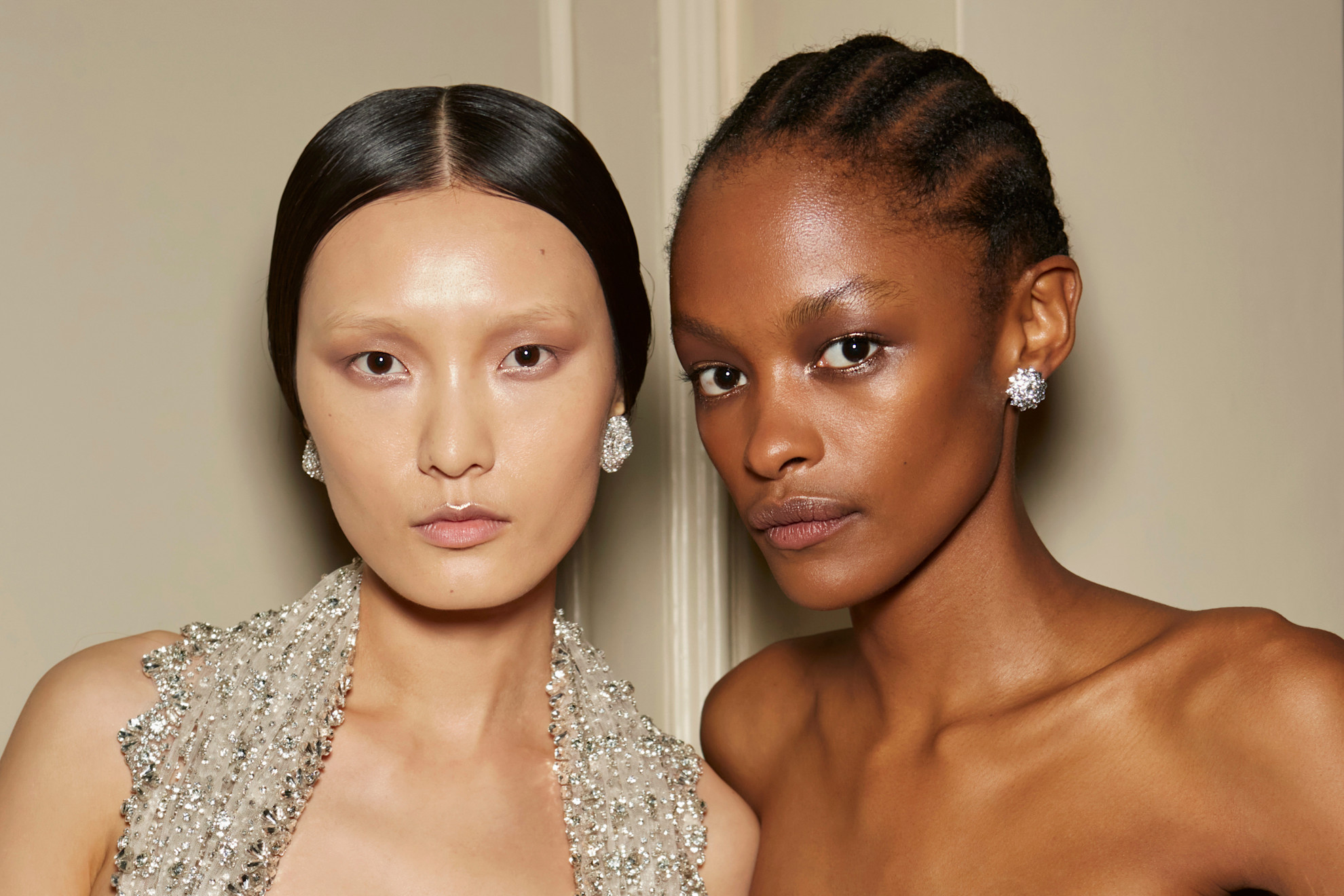
Select the newsletters you’d like to receive. Then, add your email to sign up.
You are now subscribed
Your newsletter sign-up was successful
Want to add more newsletters?

Delivered daily
Marie Claire Daily
Get exclusive access to fashion and beauty trends, hot-off-the-press celebrity news, and more.

Sent weekly on Saturday
Marie Claire Self Checkout
Exclusive access to expert shopping and styling advice from Nikki Ogunnaike, Marie Claire's editor-in-chief.

Once a week
Maire Claire Face Forward
Insider tips and recommendations for skin, hair, makeup, nails and more from Hannah Baxter, Marie Claire's beauty director.

Once a week
Livingetc
Your shortcut to the now and the next in contemporary home decoration, from designing a fashion-forward kitchen to decoding color schemes, and the latest interiors trends.

Delivered Daily
Homes & Gardens
The ultimate interior design resource from the world's leading experts - discover inspiring decorating ideas, color scheming know-how, garden inspiration and shopping expertise.
In terms of targeted skincare, you want hyaluronic acid if your skin needs a boost of hydration. You need vitamin C for daily antioxidant protection. AHA and BHAs aid in exfoliation, and peptides enhance skin suppleness. But when it comes to the best niacinamide serums? Be prepared to target a handful of skin concerns in one fell swoop.
Niacinamide is a “skincare superstar,” says board-certified dermatologist Dr. Lian Mack, MD, of the versatile form of vitamin B3. “In skincare, niacinamide helps to reduce redness, hyperpigmentation, pore size, strengthen the skin barrier, regulate sebum production, and act as an antioxidant.” It's also key for skin barrier support, reducing sensitivity, calming inflammation, and regulating oil production. "This makes it especially effective for improving overall skin texture and tone," says Lisa Chevalier, M.M.S., PA-C, a Physician Associate and Founder of SoVous Medical Spa and Laser Center in New York.
The list of benefits goes on. Other well-documented benefits of niacinamide include reducing hyperpigmentation, softening fine lines through improved elasticity, and calming redness and blotchiness, even in rosacea-prone skin, Chevalier adds.
With the ingredient's great adaptability top of mind, a top-notch niacinamide serum is a welcome addition to just about any skincare routine. Still, it’s key to be discerning when scooping up your serum. You want to take the concentration of niacinamide into account and factor in what other ingredients were included in the formulation. To find the best niacinamide serum for you, scroll ahead. Top dermatologists (and yours truly!) are breaking down exactly what to look for.
The Best Niacinamide Serums
- The Best Niacinamide Serum Overall: Marie Veronique Soothing B3 Serum
- The Best K-Beauty Niacinamide Serum: ma:nyo Galac Niacin 2.0 Essence
- The Best Niacinamide Serum That Doubles as a Highlighter: Glow Recipe Watermelon Glow Niacinamide Dew Drops Serum
- The Best Routine-Enhancing Niacinamide Serum: B-Goldi Bright Illuminating Drops with 5% Niacinamide
- The Best Smoothing Niacinamide Serum: Grown Alchemist Skin Renewal Serum
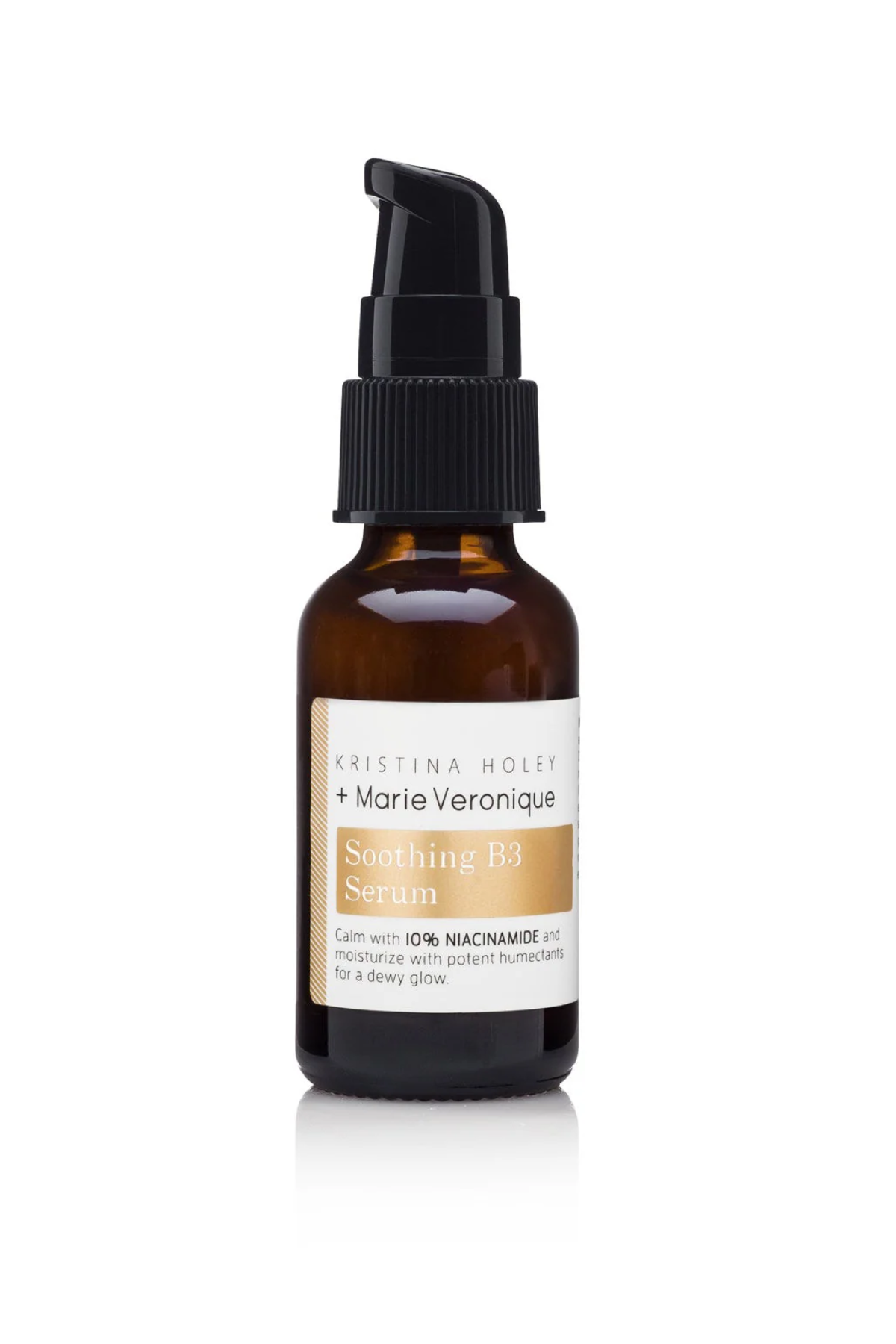
The products in skincare specialist Kristina Holey and Marie Veronique formulator Marie Veronique Nadeau's collaborative line were designed to address common skin conditions, which is a pretty great and straight-to-the-point idea for formulation. This innovative gel serum is one of the first products they came up with. It calms the skin with 10 percent niacinamide while moisturizing with potent humectants for a dewy glow. Daily application will help tackle redness and blotchiness, and every skin type can benefit—rosacea-types included.
Size: 1 oz.
Skin Type: All
Niacinamide Concentration: 10 percent
Key Ingredients: Panthenol (hydrating); Licorice root (brightening); Green tea extract (anti-inflammatory)
What I Love: Skin looks gorgeous immediately after use; Stellar ingredients; Safe for all skin types; Hydrating
What I Don't: More expensive than other options; Takes a little time to sink into your skin
Review for MC: "I'm late to the game, but Marie Veronique is my current skincare fixation. My best friend told me about their Balancing HypoTonic a few years back and their products have been taking over my routine, one by one, ever since. The Soothing B3 Serum does feel tacky when it goes on, which I honestly kind of like—it makes me take a second to sit with it instead of rushing through my routine. Before long it's absorbed without any leftover oiliness and stickiness and I'm a thousand times glowier. Me and this gel serum are going to be friends for a long, long time." — Sophia Vilensky, Contributing Beauty Writer
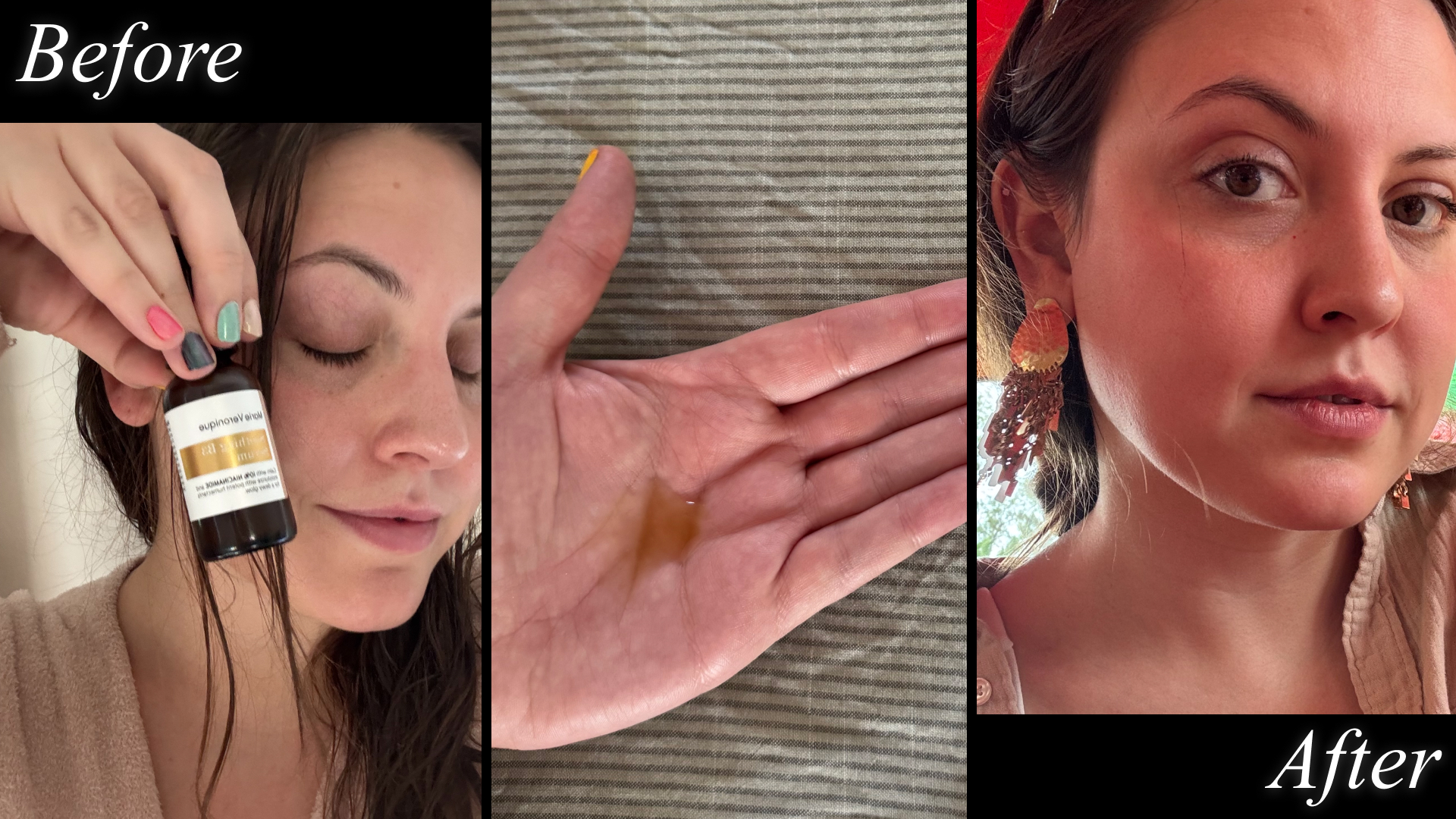
Contributing Beauty Writer Sophia Vilensky tests Marie Veronique's B3 Serum.
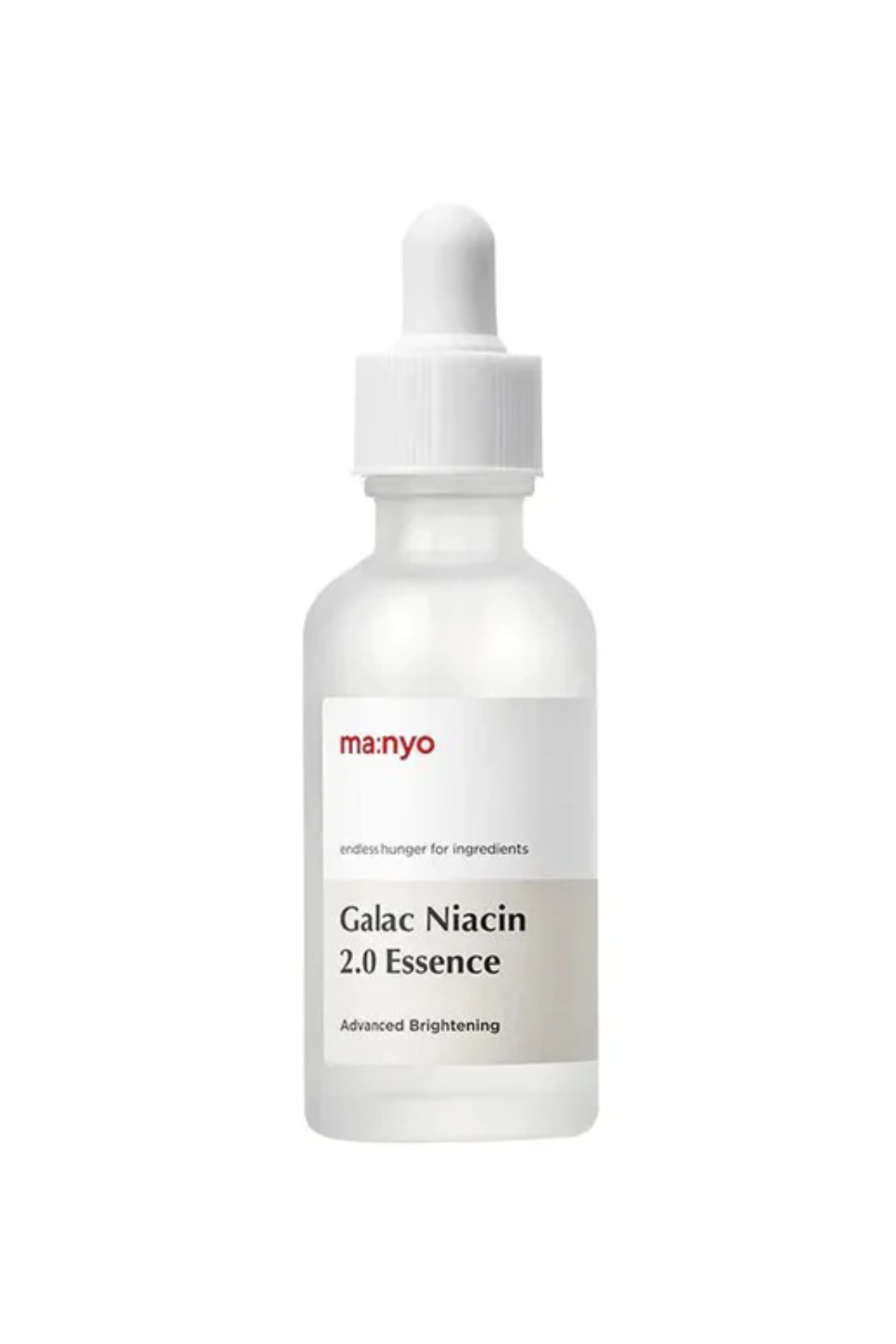
While the name doesn't necessarily roll off the tongue, ma:nyo's Galac Niacin 2.0 Essence is as charming a niacinamide serum as can be. The K-beauty brand's offering was specifically formulated to improve skin tone and texture. It's powered by galactomyces—pronounced "galacto-my-sees," again, what a name!—a type of yeast fungus that provides a range of beneficial effects. These include brightening, hydrating, and reducing the appearance of pores and wrinkles for a double dose of skin brightening assistance.
Size: 1 oz.
Skin Type: All
Niacinamide Concentration: 4 percent
Key Ingredients: Galactomyces (improve product absorption); Glutathione (revitalizing)
What I Love: Affordable; Absorbs quickly; No discernible scent
What I Don't: Formula is very watery
Review for MC: "New(er) to the scene, K-beauty brand ma:nyo won me over quickly when I tried their excellent cleansing oil, and I haven't been disappointed by one of their offerings since. (I've tried most of them, and there are a lot). This special little serum has a super watery texture that I adore as long as I get it on my face before it slips through my fingers. Tapping the essence into my skin makes me feel like the fancy, put together lady I hope to be someday...but the product makes my skin look way, way younger." — Sophia Vilensky, Contributing Beauty Writer
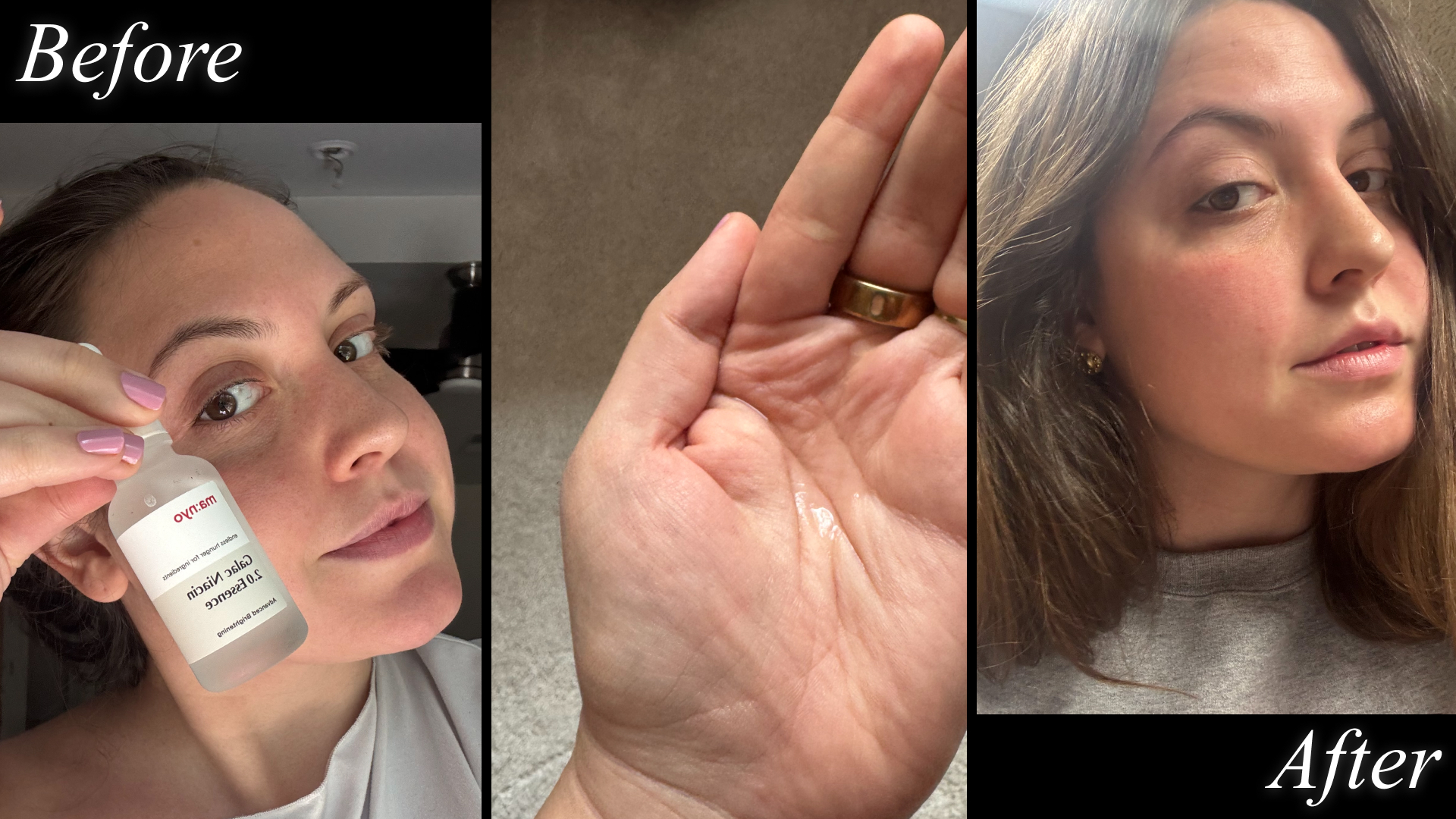
Contributing Beauty Writer Sophia Vilensky tests ma:nyo's Galac Niacin 2.0 serum. Can you see how watery it is? It slipped out of her hand right after that middle photo was snapped.
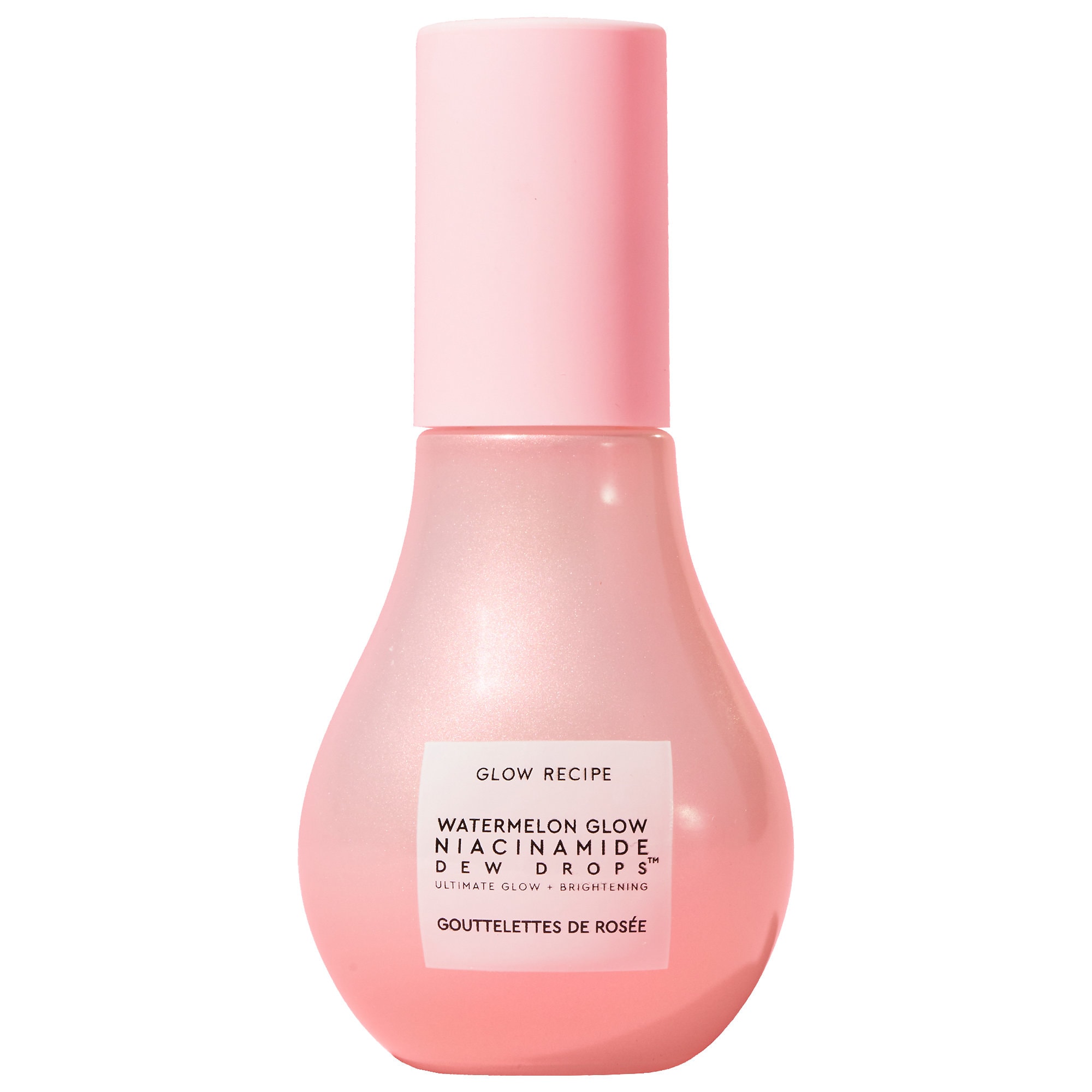
It shouldn’t come as a shock that this skincare staple has earned a cult-like following—it’s intensely nourishing, glow-boosting, and doubles as the perfect clear highlighter on top of makeup. “I love the hydrating effects of this serum,” says Dr. Mack. “Niacinamide is coupled with hyaluronic acid, creating a dynamic, hydrating duo.” It smells like watermelon (obviously) and has a slight shimmer.
Size: 1.35 oz.
Skin Type: All
Niacinamide Concentration: N/A
Key Ingredients: Watermelon (hydrating and brightening); Hyaluronic acid (hydrating)
What I Love: Leaves you with a gorgeous glow; Fun scent; Can also be used as a highlighter
What I Don't: Scent is strong
Review for MC: "My sister (see below) and I are both longtime fans of this niacinamide serum. I don't remember who found it first, but I do know my bottles have disappeared every once in a while. I've admittedly used my fair share when raiding her skincare cabinet, too. I'm picky with scents, but find this one so bright and fun. My dull winter skin is especially thankful it exists—both for its brightening and hydrating powers and the fact that the watermelon scent gives a little taste of summer any time of year. — Sophia Vilensky, Contributing Beauty Writer
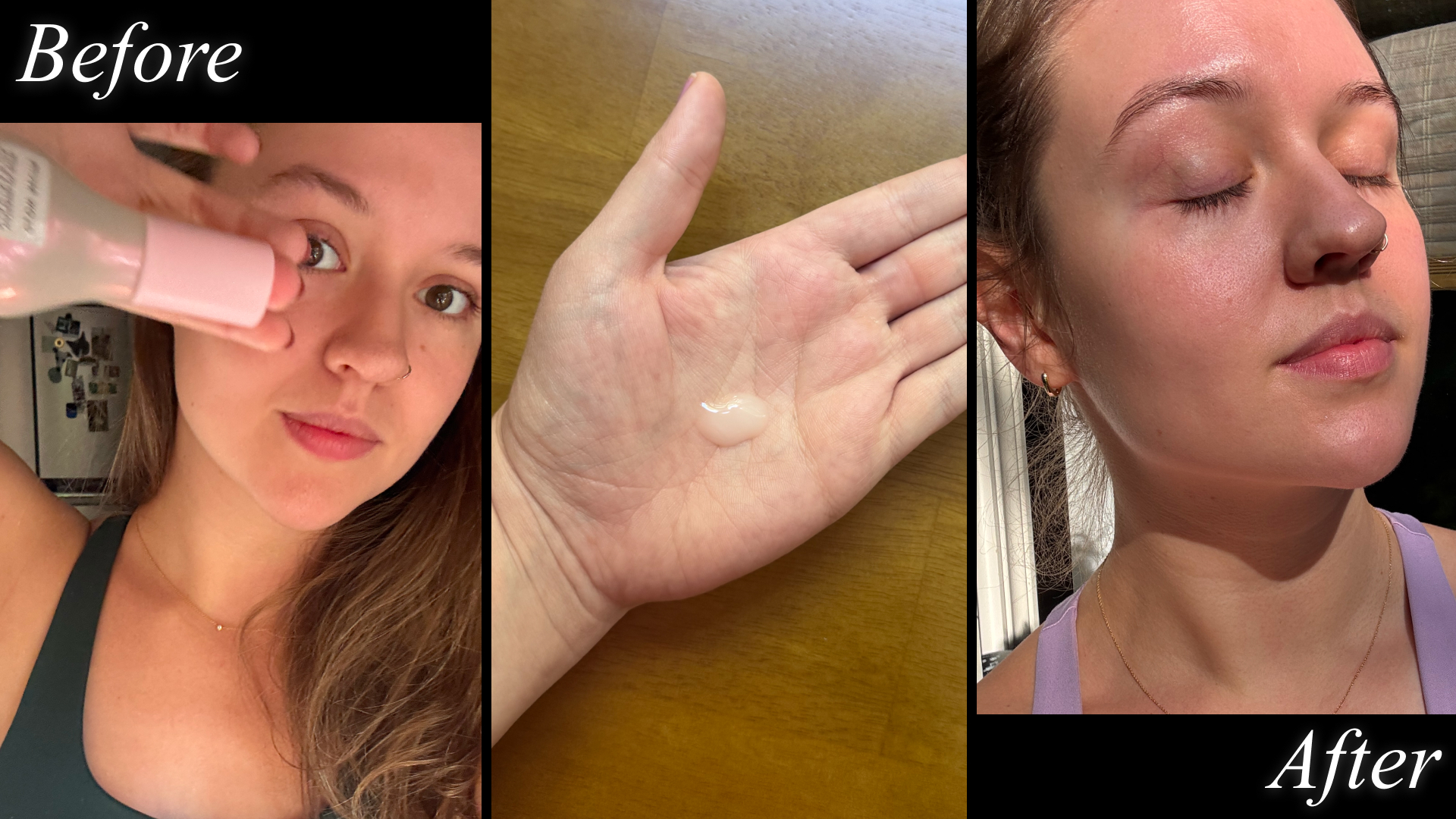
The little sister in question, Ava Vilensky, tests Glow Recipe's Watermelon Glow Niacinamide Dew Drops Serum. Maybe it does look better on her.
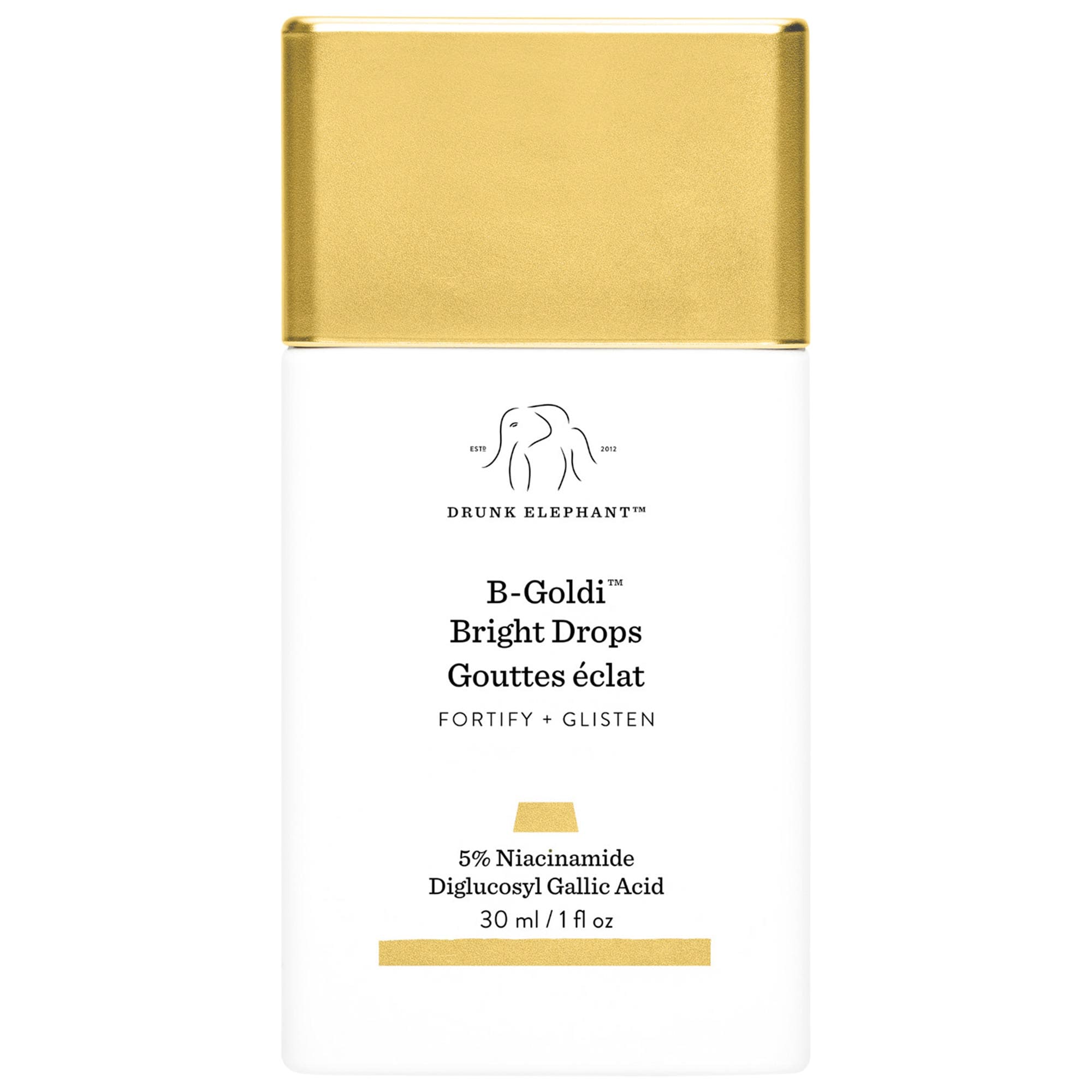
It's time to glow, honey. This genius serum by Drunk Elephant offers an easy golden finish that you can see right off the bat while its active ingredients work their magic (that is, even your skin tone and improve clarity and radiance) over time. The goal here is to mix a couple drops with your other favorite serums or face oil, so you can power up your skincare routine in a way that works for you.
Size: 1 oz.
Skin Type: All
Niacinamide Concentration: 5 percent
Key Ingredients: Diglucosyl gallic acid (inhibits excess melanin production); Morus alba leaf extract (soothing)
What I Love: Fits into any routine; Leaves a gorgeous glow; Both immediate and long-term skincare benefits
What I Don't: Small bottle; Easy to squeeze out too much product
Review for MC: "Magic product alert!!! Drunk Elephant's B-Goldi drops feel like something from another, easier world where a literal droplet of the nicest feeling serum can brighten your whole face, and thus day. But it actually exists! I love mixing a couple of drops in with my face oil at the beginning of my skincare routine, or adding it to my tinted moisturizer or foundation when I'm going a little harder with the makeup. It's a must no matter what the day has in store, and works beautifully however I choose to utilize it." — Sophia Vilensky, Contributing Beauty Writer
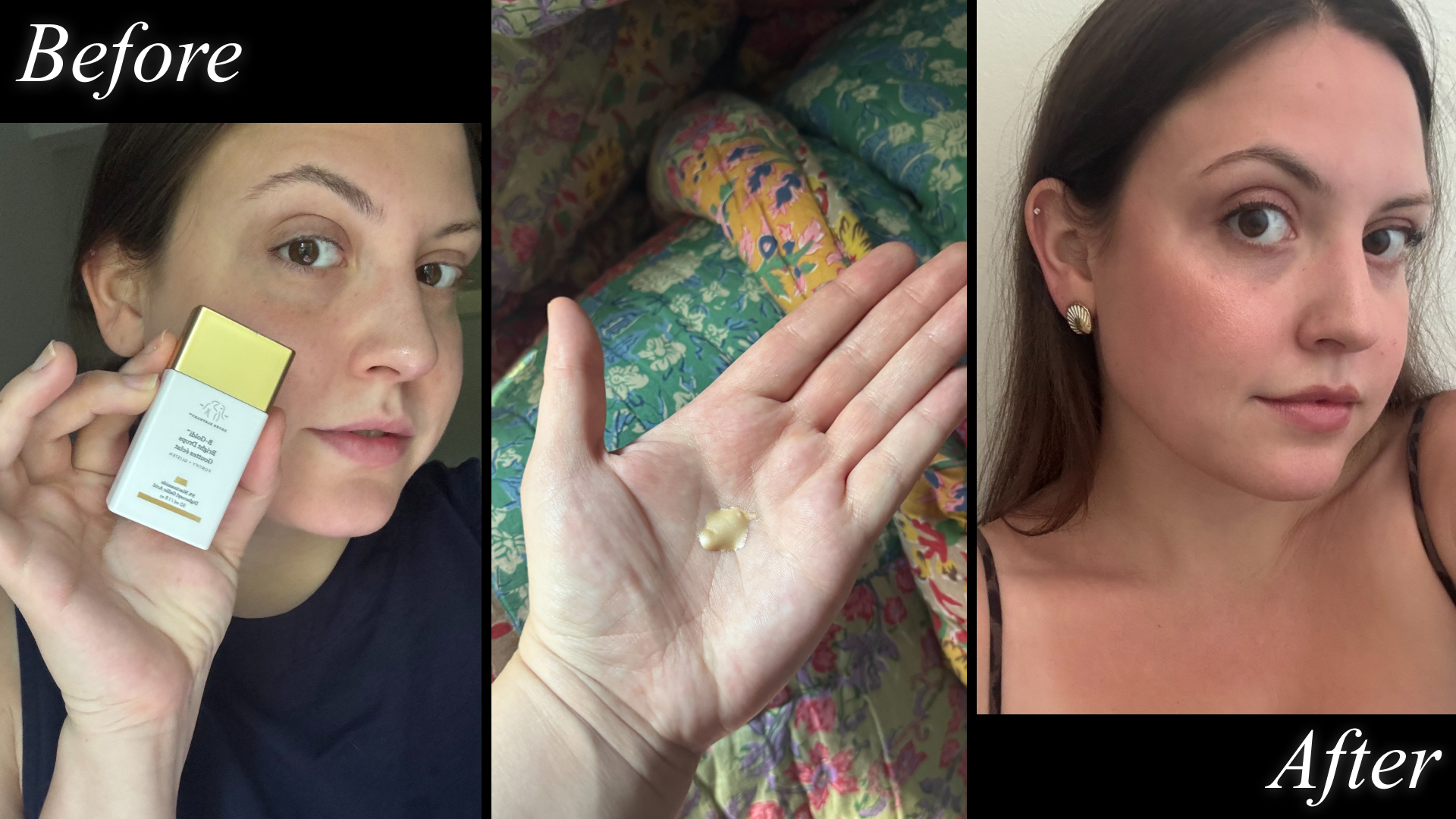
Contributing Beauty Writer Sophia Vilensky tests Drunk Elephant's B-Goldi serum. The glow sells itself.
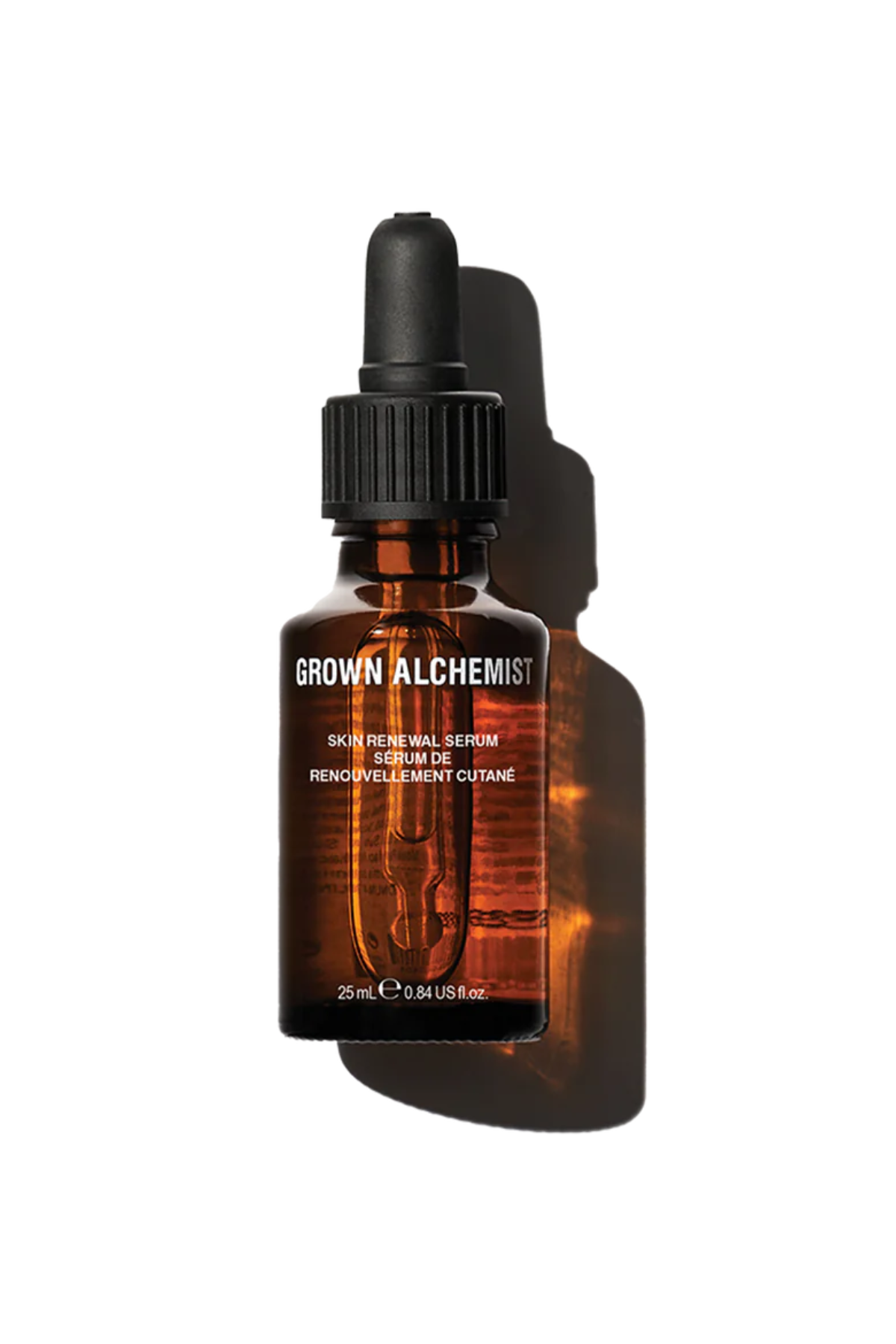
"Grown Alchemist is one of those stealth wealth brands that manages to be both understated and luxe," wrote Marie Claire's beauty team when the brand was offered the best hand soap award in the 2025 Skin & Hair Awards. That sentiment carries over to their skincare line. This bestselling daily use serum targets stressed skin, using actives to visibly reduce signs of aging and oxidative damage while also working to alleviate signs of stress and improve future resilience with apoptogenic ingredients (they induce apoptosis, or programmed cell death) like ashwagandha.
Size: 0.84 oz.
Skin Type: All
Niacinamide Concentration: N/A
Key Ingredients: Glycerin, sodium hyaluronate, butylene glycol, and saccharide (hydrating); Botanical actives (antioxidant and adaptogenic properties); Fructose (hydrates and maintains skin barrier function)
What I Love: Absorbs nicely; Doesn't feel tacky or greasy
What I Don't: Expensive for its less-than-one-ounce size
Review for MC: "I started using this serum back in the spring and it really did change the game while I waited for the midwest to defrost. My dryness dissipated, leaving my skin feeling fresh and healthy. All niacinamide serums have multiple benefits, but I do think the key word for this one is 'smoothing.' I didn't realize how textured my skin was until that texture was no longer there—and I credit this serum for that clarity." — Sophia Vilensky, Contributing Beauty Writer
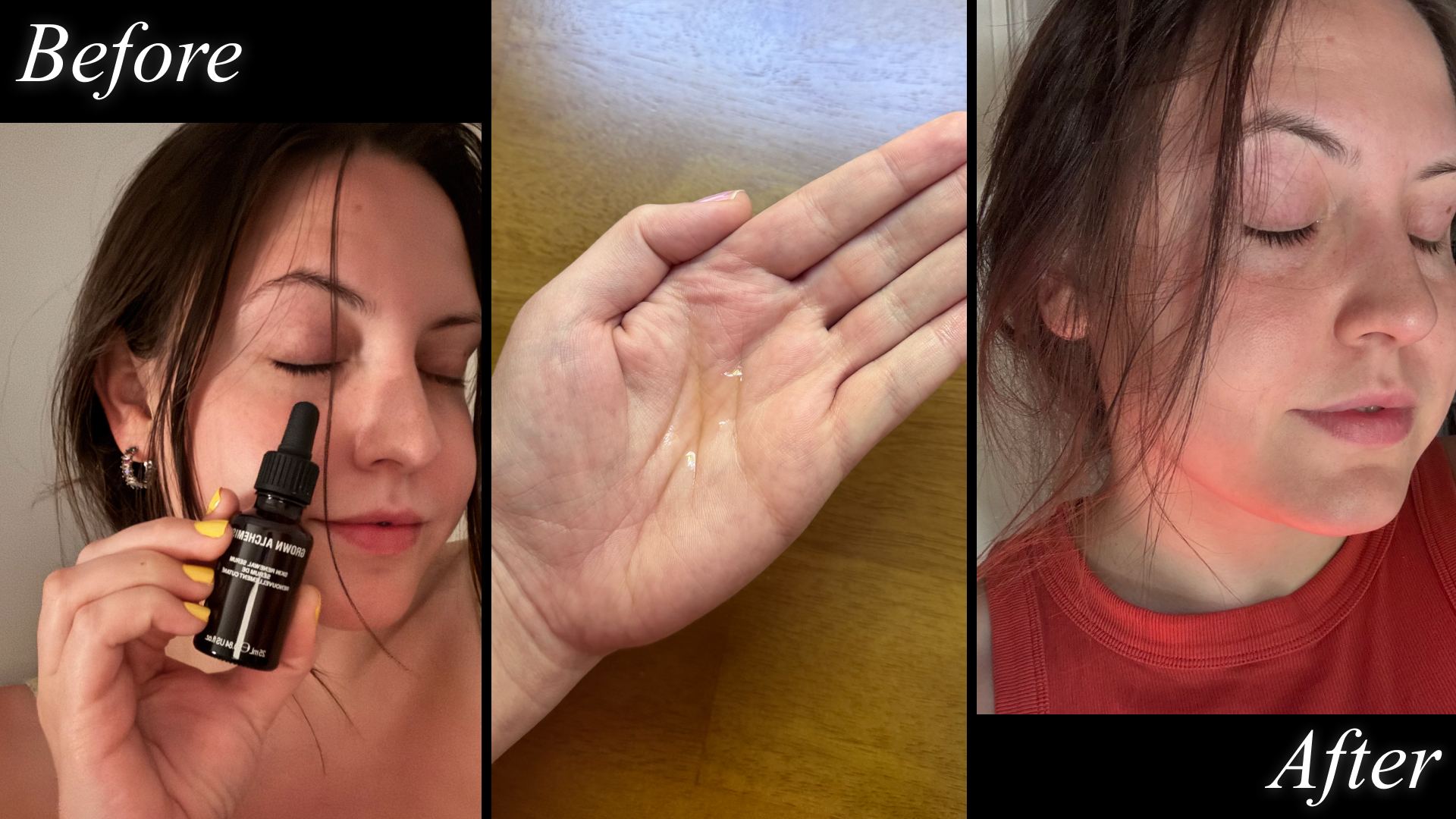
Contributing Beauty Writer Sophia Vilensky tests Grown Alchemist's B-Goldi serum. The glow sells itself.
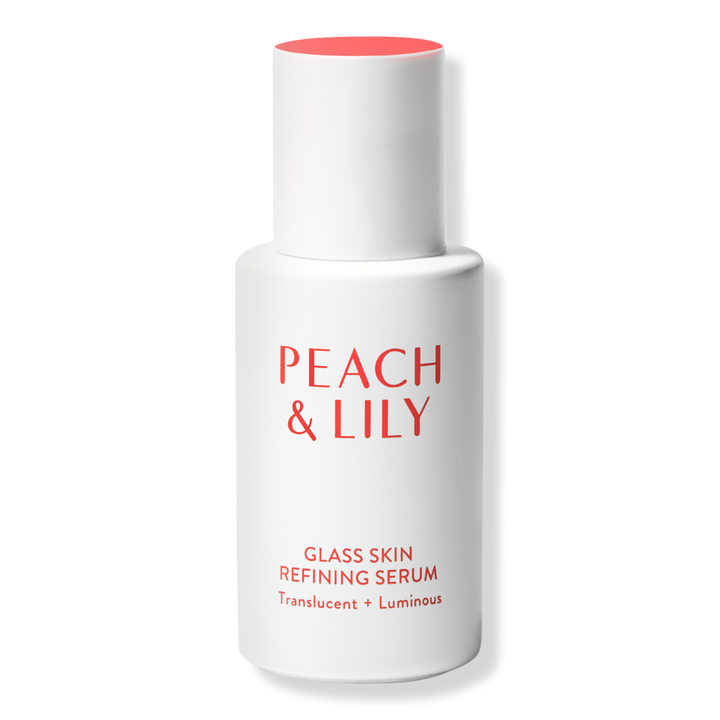
K-beauty superstar and "glass skin" coining Peach & Lily's bestselling product will single-handedly give your skin a disco-ball like iridescence in just a few weeks' time. The niacinamide expertly reduces the look of dark spots and brightens the skin’s overall complexion while complementary ingredients like peptides, hyaluronic acid, and peach extract offer a bouncy, supple effect. Try adding just this one product into your regimen—you’ll be mesmerized by your skin’s transformation.
Size: 1.35 oz.
Skin Type: All
Niacinamide Concentration: N/A
Key Ingredients: Peach extract (supplies antioxidants and vitamins); Hyaluronic acid complex (hydrating); Peptide complex (boosts collagen)
What I Love: Lightweight texture; Fades dark spots with ease; Works well with makeup for a dewy effect; Non-greasy
What I Don't: Nothing
Customer Review: “It's not aggressive or irritating, and I have very sensitive skin. I love that it's fragrance-free and it feels like they really invested in the actual formula and not some kind of marketing gimmick to make it cutesy like a lot of skincare companies do which I appreciate. It sinks in beautifully and layers well with my moisturizer, sunscreen, and makeup.” — Ulta
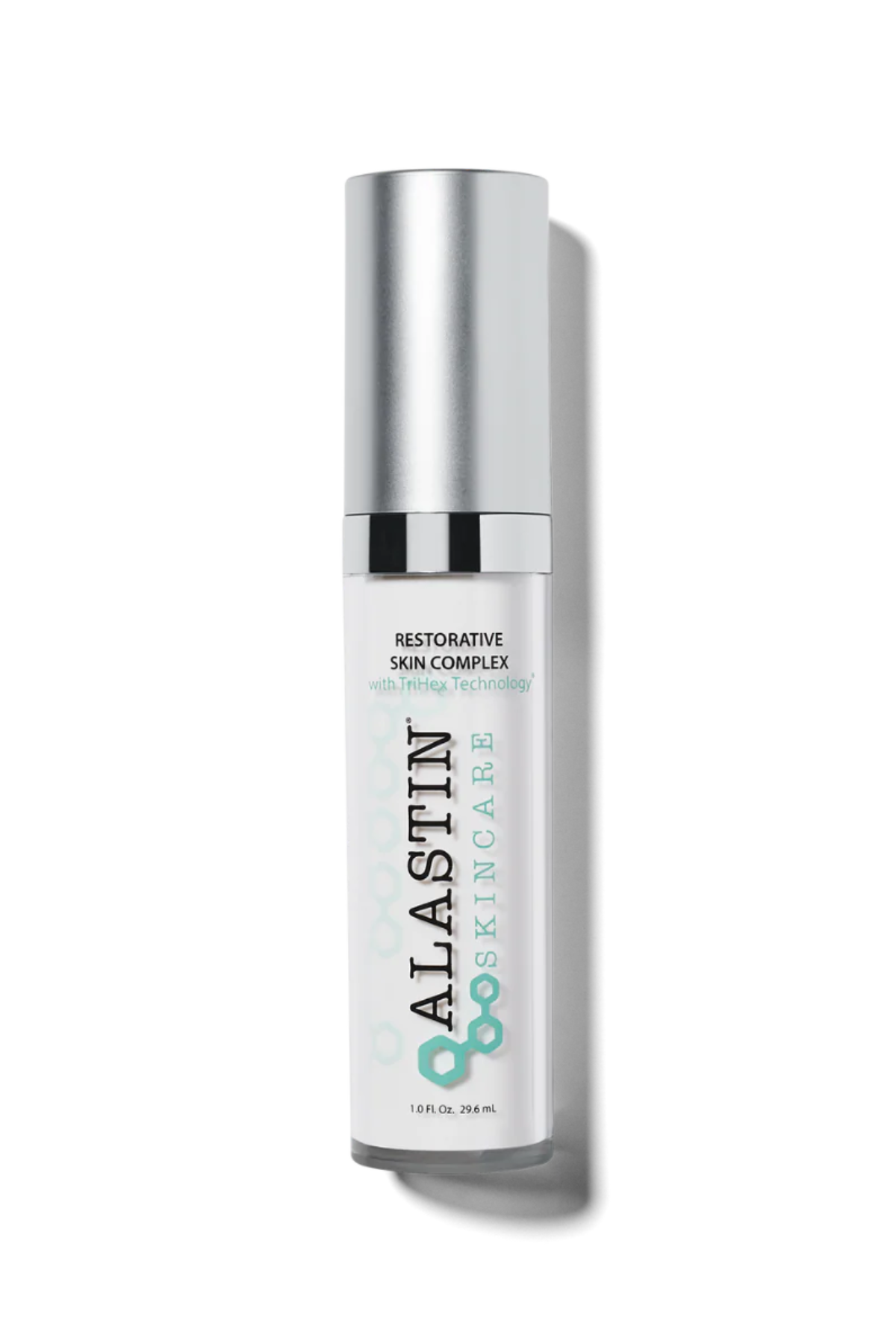
Chevalier's personal favorite niacinamide serum is medical-grade skincare brand Alastin's Restorative Skin Complex. It includes niacinamide alongside the brand's proprietary TriHex Technology, a patented blend of active peptides and botanicals that support your skin's natural life cycle. "It’s ideal for prepping the skin before procedures and supporting recovery afterward," explains the expert. "This formula helps clear damaged collagen, improves elasticity, and strengthens thinning or aging skin."
Size: 1 oz.
Skin Type: All
Niacinamide Concentration: N/A
Key Ingredients: TriHex technology (supports natural collagen production); Silver mushroom (hydrating)
What I Love: Expert-approved; Immediate results; Soaks in quickly; Leaves skin feeling soft
What I Don't: Expensive
Customer Review: "This product was recommended to me by my dermatologist several years ago as part of my daytime and nighttime skin care routine. It is very effective in keeping my skin hydrated and soft. I use 2 pumps of the cream 2 times a day. It soaks in right away and has no odor…just easy, clean and pure." — Amazon
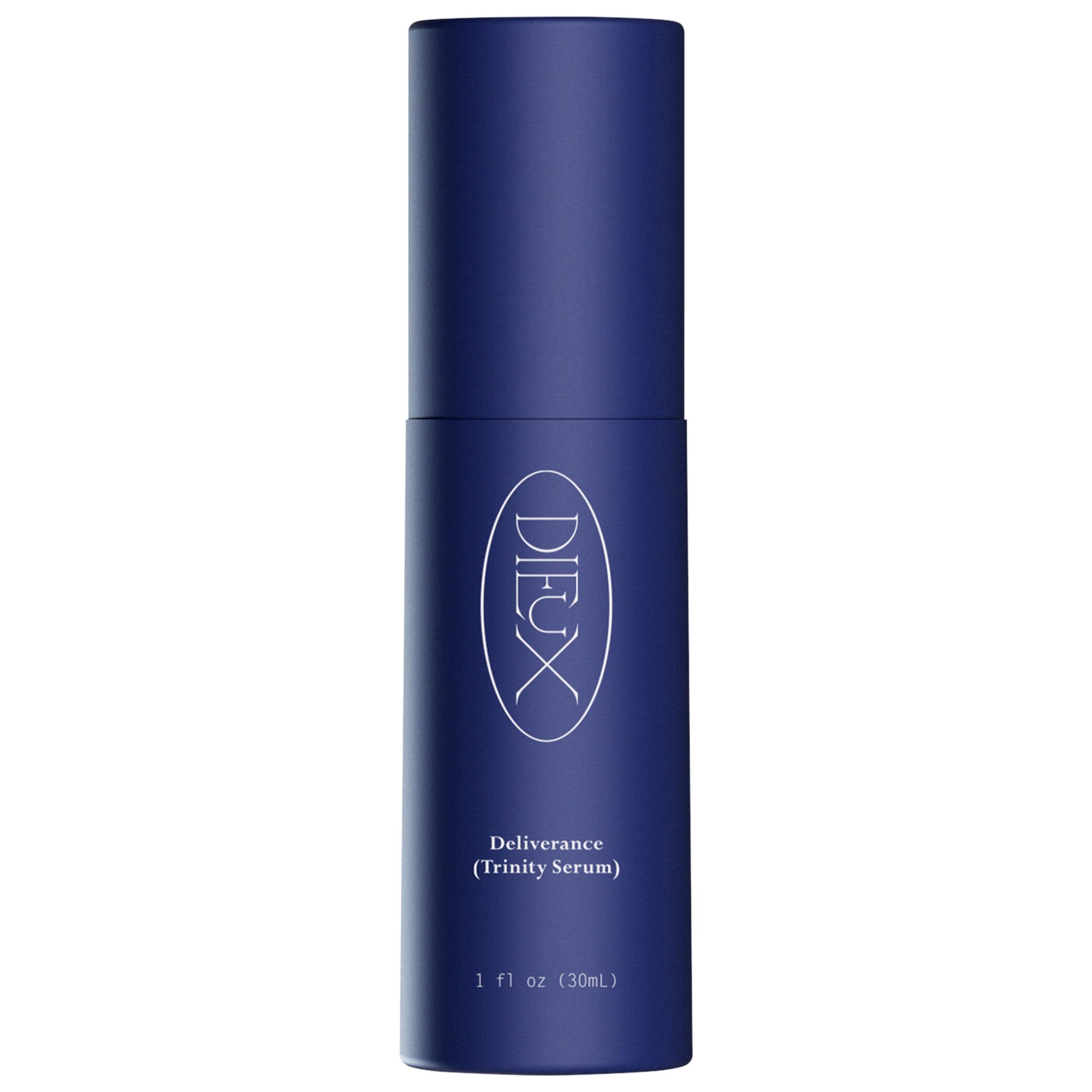
Deliverance was recommended to me by two beauty experts I trust with all my heart: my own esthetician (love you, Maritza) and Marie Claire Beauty Director Hannah Baxter. "I love this one because it’s gentle and helps with irritated and red skin. I’ve got a lot of sensitive-skinned Midwestern clients so this one is great for them," explained my esthetician. This really does the job when it comes to redness and feels amazing to apply.
Size: 1 oz.
Skin Type: All
Niacinamide Concentration: 4 percent
Key Ingredients: Antioxidant blend of encapsulated cannabinoids, water lily, and green tea (protecting and soothing); Peptide blend (smoothing and firming)
What I Love: Expert-approved; Potent formula is still nice and gentle on sensitive skin; Lightweight texture
What I Don't: Nothing
Customer Review: "I’m a skincare junkie and have loved having a maximalist skincare routine in the past, but after becoming a mom I really had to streamline things for my own sanity! Reduces redness, plumps, hydrates, and strengthens my barrier so my hard hitting products like retinoids can do their job without wrecking my face. Love love love this product." — Sephora
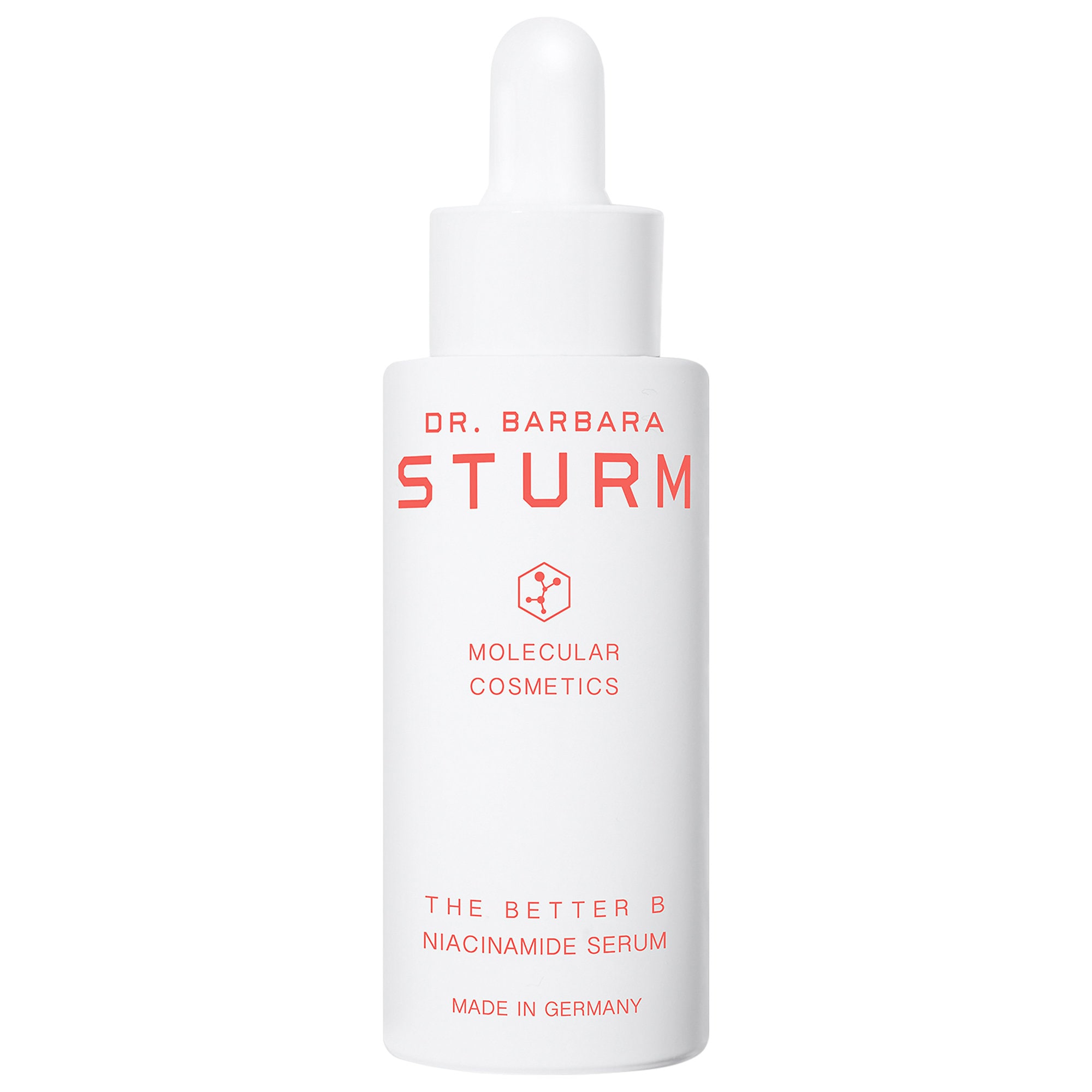
More often than not, skin freakouts by way of acne, rashes, or rosacea, are the result of a compromised skin barrier. Building it back up is the best solution. Cut to: Dr. Barbara Sturm’s The Better B Niacinamide Serum. Niacinamide does most of the heavy lifting here, but ingredients like plankton extract and panthenol are there to provide a welcome assist. Plus, the milky formula feels instantly soothing when pat into the skin.
Size: 1 oz.
Skin Type: All
Niacinamide Concentration: 5%
Key Ingredients: Marine plankton extract (hydrating and barrier supporting); Panthenol (hydrating and soothing)
What I Love: Milky texture feels so soothing; Effective; A little goes a long way
What I Don't: Expensive
Customer Review: "This serum is great! I have sensitive oily skin and get little bumps sometimes that aren’t even breakouts and this helps with seemingly all of that. The bumps have gone way down since use and this makes my skin feel so smooth and happy!" — Sephora
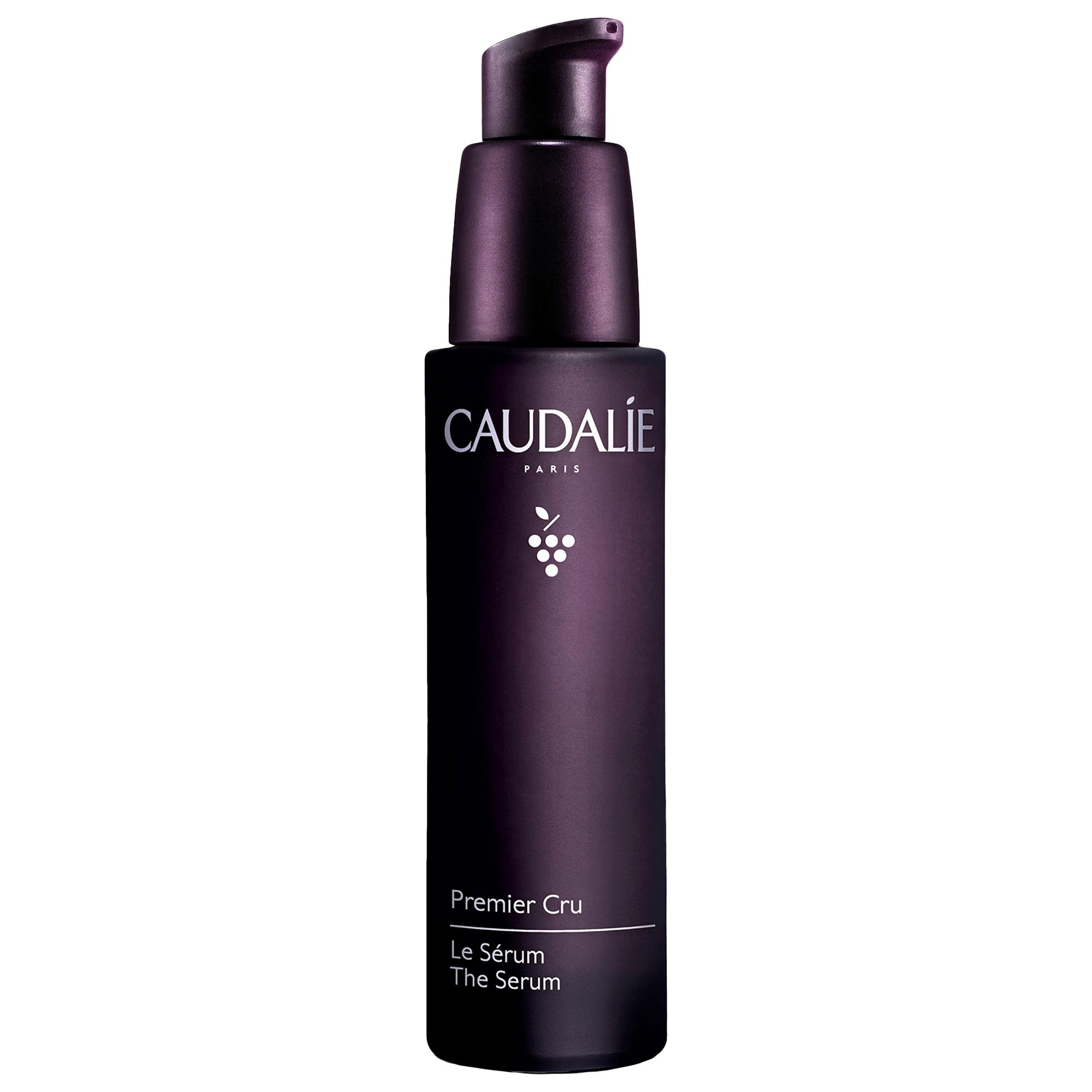
Chronically dry skin? Give this intensely hydrating serum a go. You *should* notice a difference in your skin’s texture in as little as a few hours. Expertly sourced tightening sugars and honey locust manage to tighten skin in as little as three minutes—and the results will stick around. And while the short-term benefits are very welcome, it’s the long-term effects that will keep you hooked on this Caudalie signature. It's formulated to target the eight signs of aging—elasticity, firmness, wrinkles, fine lines, dark spots, radiance, hydration, and plumpness—with continued use.
Size: 1 oz.
Skin Type: All
Niacinamide Concentration: N/A
Key Ingredients: Plant sugars (firming)
What I Love: Great for aging skin; Well tolerated; Results are visible almost immediately
What I Don't: Expensive
Customer Review: “Expensive but worth it. I eliminated several products by just using this! I love it. Just finishing my first bottle and planning to buy the next asap! I love how it feels on my skin and how it looks directly after applying.” — Sephora
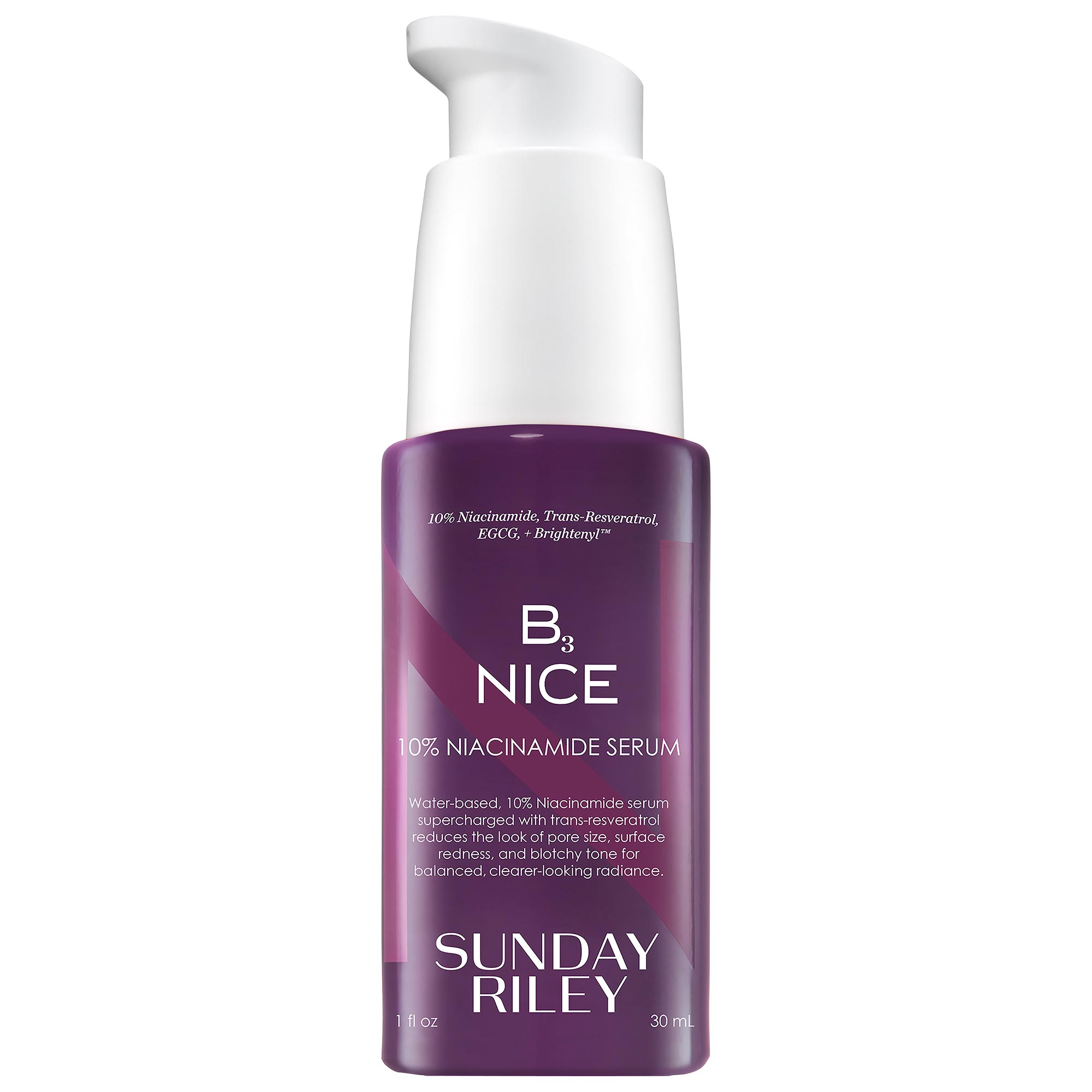
Sunday Riley’s 10% Niacinamide Serum is a need—not a want—if you have sensitive, redness-prone skin that craves a little TLC. The niacinamide obviously helps with evening tone from an inflammation perspective, but an ingredient called trans-resveratrol is really what amplifies the product’s redness-reducing powers. Your blotchy tone will all but disappear, hyperpigmentation will begin to fade, and your skin will look more even, calm, and happy after just a few uses.
Size: 1 oz.
Skin Type: All
Niacinamide Concentration: 10%
Key Ingredients: Diglucosyl gallic acid (soothing); Trans-resveratrol (brightening)
What I Love: Ideal for redness; Very brightening; Works quickly;
What I Don't: Concentration might be too strong if you have sensitive skin; Some Sephora customers have reported receiving expired bottles—check your lot number
Customer Review: "I really like this serum! Niacinamide never did much for me but after a week, I noticed a decrease in redness and my skin tone was even. Not to mention it helped decongest my pores as well. Love this and will continue using." — Sephora
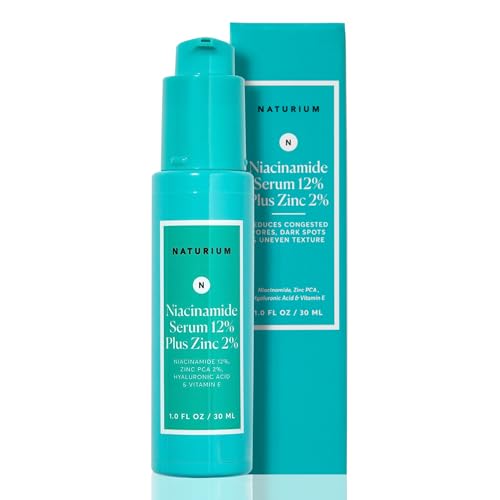
Naturium is one of the best brands in the business for highly concentrated actives at affordable price points. Take this serum, for example. It not only contains 12 percent niacinamide (whoa), but also two percent zinc PCA. In tandem, they effectively reduce the appearance of dark spots, smooth out fine lines, and reduce the appearance of pores.
Size: 1 oz.
Skin Type: All
Niacinamide Concentration: 12%
Key Ingredients:
What I Love: Affordable; Contains zinc; pH-appropriate formula; Feels nice on the skin
What I Don't: Nothing
Customer Review: "I love this product! It is a super light serum that absorbs really well. There is never a feeling of greasiness on my skin. I have mild rosacea and dry/sensitive skin and my skin tolerates this product really well. I think it has helped clear breakouts, redness, and dark spots on my skin. It has also improved my overall skin texture." — Amazon
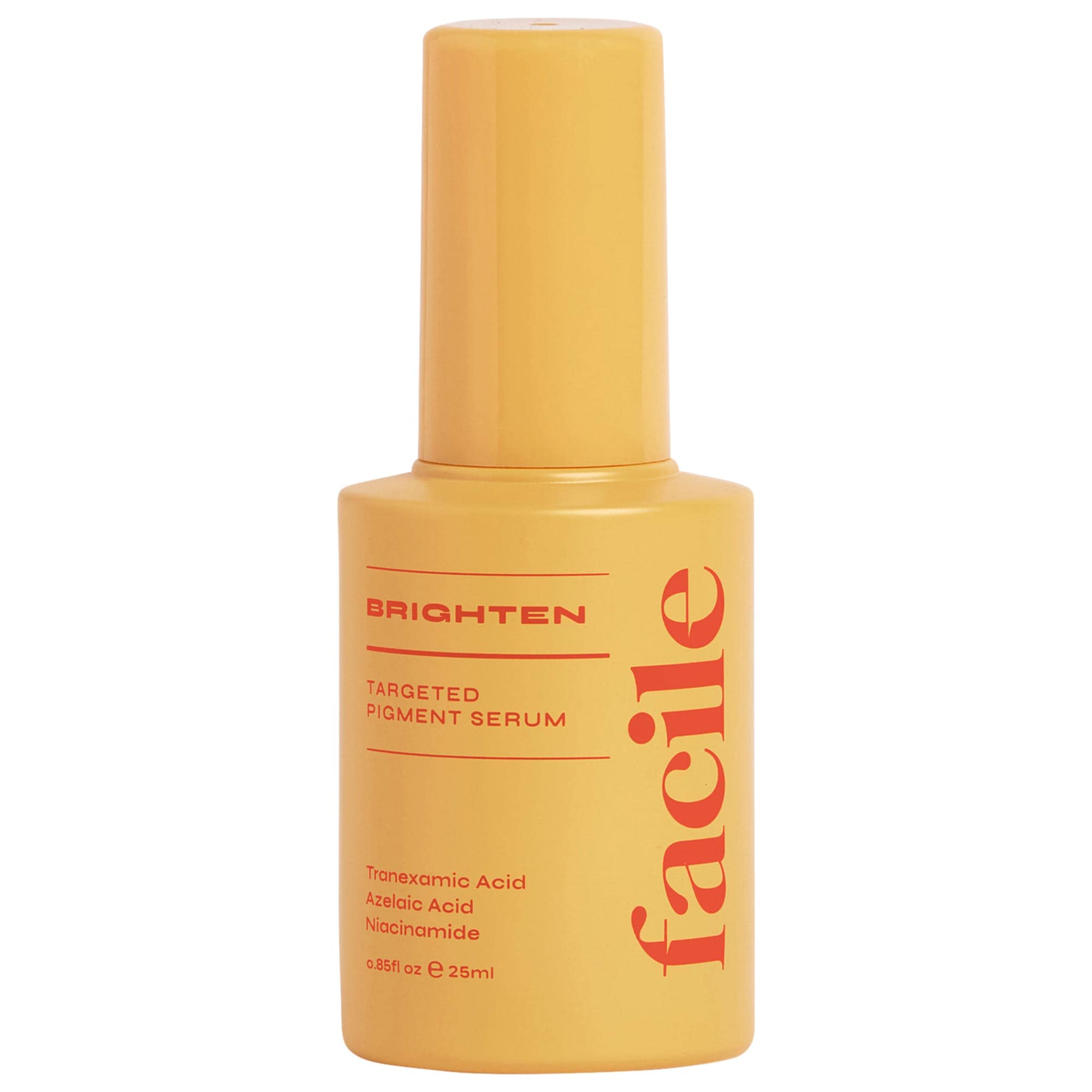
Facile's tagline is "maximum benefits, minimal effort." When it comes to achieving a smooth, even, and naturally radiant complexion, I think that's a vision we can all get behind. This super-lightweight, dermatologist-developed serum packs a punch with niacinamide, vitamin E, and licorice root extract to visibly fade discoloration and smooth your skin texture. It's also worth noting the brand's Los Angeles roots. Not only is Facile cool, this serum is great for year-round use (wherever you find yourself in the world).
Size: 1 oz.
Skin Type: All
Niacinamide Concentration: 5%
Key Ingredients: Azelaic acid (brightening); Tranexamic acid (evens skin tone)
What I Love: Super lightweight texture; No pilling; Feels hydrating
What I Don't: Sells out; Dries a bit slow
Customer Review: "I am so in love with this product! Normally my skin is so sensitive when I try new products, but this one didn’t break me out or anything! Left my skin feeling so amazing and refreshed. Definitely using again and again." — Sephora
What to Look For in a Niacinamide Serum
- Concentration
More isn’t always better—especially when it comes to the concentration of your favorite skincare ingredients. When deciding what niacinamide concentration will be best for you, it's important to consider your skin type. If you’re sensitive to new products, easing into the ingredient is best. “Look for lower concentrations of one to two percent,” says Dr. Mack. “At higher concentrations, niacinamide may actually cause redness, irritation, or contact dermatitis, which manifests as a red, scaly rash.”
That said, if you tolerate new ingredients fairly well or are specifically concerned with treating discoloration, the two to 10 percent range is perfect. “If you are using niacinamide to treat dark spots, I would recommend the five to 10 percent concentration,” explains board-certified dermatologist Dr. Anna Karp, MD.
As you might've noticed above, not every brand shares how much niacinamide they actually use in their product. My best advice is to check its placement on the ingredient list—the higher it is, the more of the ingredient is present. Also, because we want to make sure your skin will tolerate whichever product you choose, make sure to patch test a small area before slathering your face.
- Other Ingredients
"One of niacinamide’s biggest strengths is how versatile it is as a team player," Chevalier says. The ingredient pairs well with just about everything. Take its relationship with vitamin C, for example. The ingredients were once thought to cancel each other out, but modern studies show they work well together to brighten skin and boost antioxidant defense. It's also a perfect companion with retinoids because it buffers irritation by strengthening the barrier and reducing inflammation.
"Combined with zinc, niacinamide helps regulate oil and reduce inflammation in acne-prone skin. Niacinamide helps lock in the hydration that hyaluronic acid draws into the skin, making this an exceptional combo for hydration and skin recovery," the expert adds. "Niacinamide can also be combined effectively with tranexamic acid, kojic acid, and arbutin for the purpose of brightening and fading pigment, providing a multi-pathway attack on dark spots.
- Consistency
Although vitamin B3 can be found in many steps of your skincare routine, niacinamide works especially well in serum form—hence the recommendations above.
“You don’t need to use multiple products with niacinamide in the same routine. You’ll see the same benefit from just one,” board-certified dermatologist Dr. Corey L. Hartman, MD, previously told Marie Claire. “I tend to recommend niacinamide be used as a serum. The thinner consistency of a serum is ideal for niacinamide, so it absorbs deeply into the skin.”
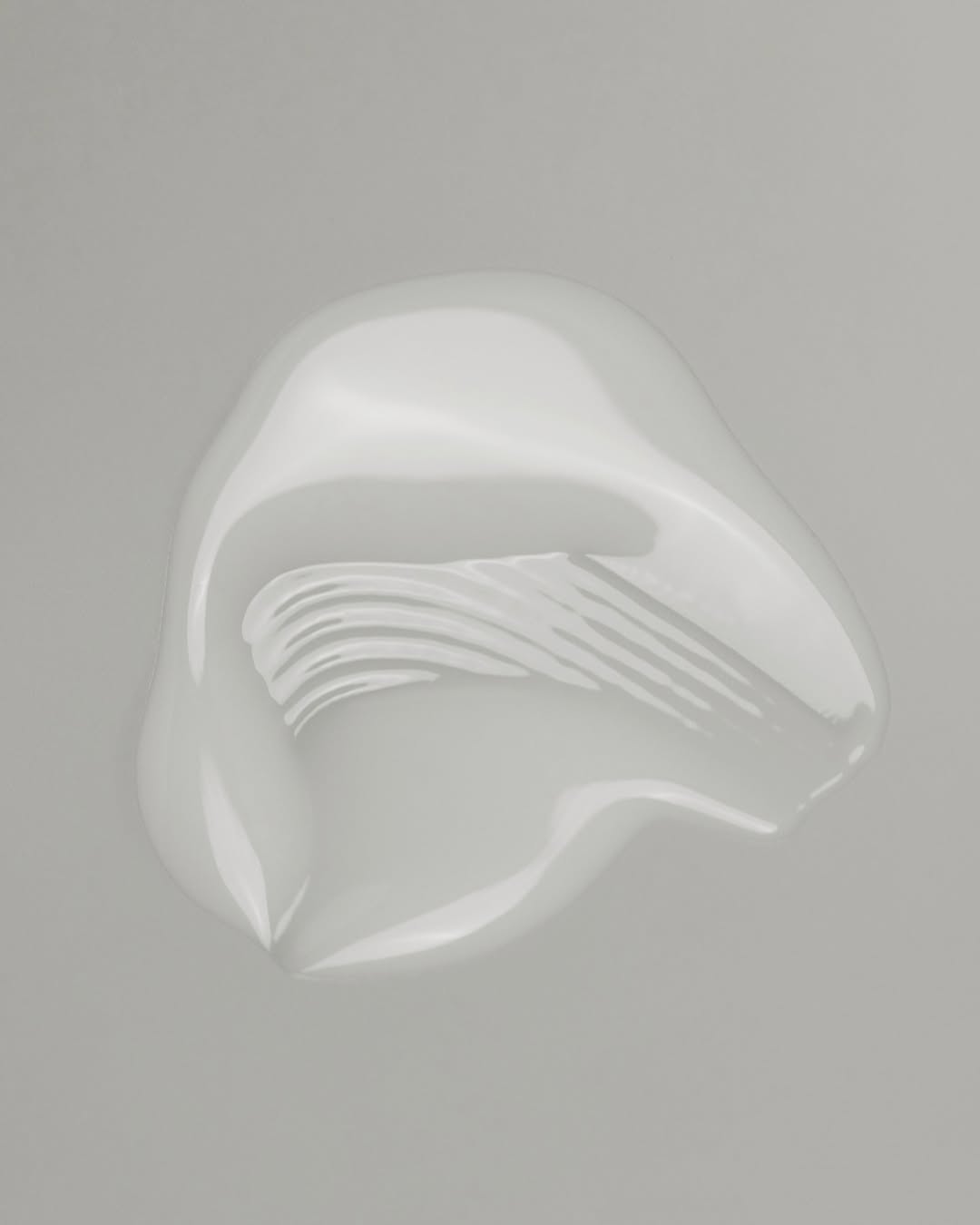
A close-up of Dieux's lovely Deliverance Serum texture.
Do I Need Niacinamide?
There’s a high probability that you'd benefit from incorporating a serum with niacinamide into your skincare routine. "Almost everyone can benefit from niacinamide as it’s incredibly well-tolerated across all skin types," says Chevalier. "It’s especially helpful for those with oily or acne-prone skin (regulates sebum, reduces breakouts), sensitive or reactive skin (restores the barrier, calms redness), dry or dehydrated skin (boosts ceramide levels), mature skin (improves elasticity and softens fine lines), and hyperpigmentation or uneven tone (fades dark spots and boosts radiance)."
The expert's only caution is to use a lower concentration—think two to five percent—if your skin is highly sensitive. "High concentrations like those at 10 percent+ can occasionally cause flushing or tingling in rosacea-prone or compromised skin," she explains. "If that happens, dial down the strength. Not everyone needs a high dose to see results."
Should I Use Niacinamide Post Procedure?
Chevalier often recommends niacinamide for patients both pre- and post-aesthetic treatments. "Using niacinamide for two to four weeks before lasers, microneedling, or even peels can strengthen the skin’s barrier and reduce downtime," she says. "It makes the skin more resilient and can even improve healing response."
Post-treatment, you can use it "to calm inflammation, support recovery, and reduce post-inflammatory pigment (especially in darker skin tones).""Just make sure the formula is gentle, fragrance-free, and ideally 5 percent or less," she adds. "In my experience, niacinamide helps clients bounce back faster with fewer flare-ups and better long-term results."
What Should I Avoid With Niacinamide?
While niacinamide works well with most other ingredients, you'll want to make sure you're not going overboard with the actives. Chevalier says that pairing niacinamide in the same step as strong acids or low pH exfoliants can reduce efficacy and/or cause flushing on the skin. "I’ve even seen people use too many active ingredients, including niacinamide, that lead to the initiation of their skin pigmentation or melasma," she notes.
Why Trust Marie Claire?
For more than 30 years, Marie Claire has been an internationally recognized destination for news, fashion and beauty trends, investigative packages, and more. When it comes to the products Marie Claire recommends, we take your faith in us seriously. Every product that we feature comes personally recommended by a Marie Claire writer or editor, or by an expert we’ve spoken to firsthand.
How We Tested
Contributing Beauty Writer Sophia Vilensky found the best niacinamide serums on the market based on customer reviews, Marie Claire editor recommendations, expert recommendations, and her own testing. After receiving samples of numerous niacinamide serums, she got to testing on her own (and her sister's!) skin, evaluating each product based on texture, price, smell, dry down, and its specific benefits before choosing the 12 best overall to highlight.
Meet the Experts

Lian Mack, MD is a board certified dermatologist committed to excellence in comprehensive dermatological care. She holds a special interest in skin conditions as it applies to skin of color, as well as all aspects of aesthetic enhancements including neurotoxins, injectable fillers, and laser treatments. She has achieved a Master Injector Certification from Allergan, the largest makers of dermal fillers and Botox.
Dr. Mack graduated magna cum laude from Columbia University, Columbia College in the City of New York. She continued her postgraduate studies at Weill Cornell Medical College, during which she did a one-year research fellowship in melanoma research at the NYU School of Medicine. After a one-year internship at New York Hospital, she went on to complete her residency in Dermatology at St. Luke’s – Roosevelt Hospital Center where she served as Chief resident during her final year. Prior to GlamDerm, Dr. Mack worked in Chelsea alongside her mentor Dr. Michael Eidelman. Currently, she volunteers as an Assistant Professor of Clinical Dermatology at Mt. Sinai Medical Center.
Dr. Mack has authored numerous peer reviewed journal articles and book chapters. She is a fellow of the American Academy of Dermatology, and a member of several professional societies including the American Society for Dermatologic Surgery, and has actively served as a member and on the board of the Women’s Dermatologic Society.

Dr. Anna Karp is a board-certified dermatologist and Assistant Clinical Professor of Dermatology at NYU School of Medicine. With a passion for both medical and cosmetic dermatology, she provides expert care to patients of all ages, specializing in medical, cosmetic, and surgical dermatology.
Dr. Karp is a fellow of the American Academy of Dermatology and the Women’s Dermatologic Society. Beyond her professional achievements, she is a dedicated mother of two and resides with her family in Brooklyn Heights.

Lisa M. Chevalier, M.M.S., PA-C is a NCCPA Board Certified New York and New Jersey licensed Physician Associate who specializes in both medical and cosmetic dermatology with a focus on laser therapies, injectables and aesthetics. She earned her master’s degree in medical sciences along with her certification in Physician Associate studies at Nova Southeastern University’s School of Medicine.
She completed her clinical rotations at New York Presbyterian Hospital, Weill-Cornell Medical College and Lenox Hill Hospital on Manhattan's Upper East Side. Prior to her Physician Associate studies, she earned a dual Bachelor’s degree in biology and chemistry from Baldwin-Wallace University while she worked as a nutrition counselor and a certified personal trainer.

Corey L. Hartman, MD, FAAD is a board-certified dermatologist as well as the founder and medical director of Skin Wellness Dermatology in Birmingham, Alabama.
Get exclusive access to fashion and beauty trends, hot-off-the-press celebrity news, and more.

Sophia Vilensky is a Freelance Beauty Writer at Marie Claire with a beauty, wellness, and entertainment journalism portfolio that includes contributions to Byrdie, Bravo, Teen Vogue, and Us Weekly. Growing up in a family of beauticians—and through her own personal studies—she developed an in-depth understanding of aesthetics, cosmetic product formulation, and beauty treatment development and has also held roles as a senior copywriter, content strategist, and proofreader for top beauty and wellness brands. Even so, you'd be hard pressed to find her with her hair and makeup actually done. Sophia is based in Minneapolis and is a 2019 graduate of the University of Minnesota, where she majored in English and minored in cinema studies. During her time at the university, she was the Arts & Entertainment Editor for the Minnesota Daily, earning the 2019 Editor of the Year award for her work. She connected deeply with the Twin Cities arts scene, collaborating with leading beauty professionals, designers, and artists. Graduating Summa Cum Laude, her thesis—a close-reading of Vanderpump Rules—was featured on NPR. When not immersed in writing or testing new products, Sophia enjoys watching reality TV, reading, and exploring the newest woo-woo wellness trends. Keep up with her on Instagram @sophiavilensky.
- Samantha HolenderSenior Beauty Editor